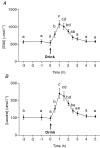Differential stimulation of myofibrillar and sarcoplasmic protein synthesis with protein ingestion at rest and after resistance exercise
- PMID: 19124543
- PMCID: PMC2669978
- DOI: 10.1113/jphysiol.2008.164087
Differential stimulation of myofibrillar and sarcoplasmic protein synthesis with protein ingestion at rest and after resistance exercise
Abstract
We aimed to determine whether there is a differential stimulation of the contractile myofibrillar and the cellular sarcoplasmic proteins after ingestion of protein and how this is affected by resistance exercise. Fasted (FAST) muscle protein synthesis was measured in seven healthy young men with a primed constant infusion of L-[ring-(13)C(6)]phenylalanine. Participants then performed an intense bout of unilateral resistance exercise followed by the consumption of 25 g of whey protein to maximally stimulate protein synthesis. In the rested (FED) leg myofibrillar (MYO) protein synthesis was elevated (P < 0.01) above FAST at 3 h (approximately 163%) but not at 1 and 5 h (P > 0.05). In contrast, MYO protein synthesis in the exercised (FED-EX) leg was stimulated above FAST at 1, 3 and 5 h (approximately 100, 216, and 229%, respectively; P < 0.01) with the increase at 5 h being greater than FED (P < 0.01). Thus, the synthesis of muscle contractile proteins is stimulated by both feeding and resistance exercise early (1 h) but has a greater duration and amplitude after resistance exercise. Sarcoplasmic (SARC) protein synthesis was similarly elevated (P < 0.01) above FAST by approximately 104% at 3 h in both FED and FED-EX suggesting SARC protein synthesis is stimulated by feeding but that this response is not augmented by resistance exercise. In conclusion, myofibrillar and sarcoplasmic protein synthesis are similarly, but transiently, stimulated with protein feeding. In contrast, resistance exercise rapidly stimulates and sustains the synthesis of only the myofibrillar protein fraction after protein ingestion. These data highlight the importance of measuring the synthetic response of specific muscle protein fractions when examining the effects of exercise and nutrition.
Figures



Comment in
-
Measuring synthesis rates of different proteins: clues to training adaptations.J Physiol. 2009 Feb 15;587(Pt 4):721. doi: 10.1113/jphysiol.2009.168641. J Physiol. 2009. PMID: 19218621 Free PMC article. Review. No abstract available.
References
-
- Biolo G, Tipton KD, Klein S, Wolfe RR. An abundant supply of amino acids enhances the metabolic effect of exercise on muscle protein. Am J Physiol Endocrinol Metab. 1997;273:E122–E129. - PubMed
-
- Borsheim E, Tipton KD, Wolf SE, Wolfe RR. Essential amino acids and muscle protein recovery from resistance exercise. Am J Physiol Endocrinol Metab. 2002;283:E648–E657. - PubMed
Publication types
MeSH terms
Substances
LinkOut - more resources
Full Text Sources
Other Literature Sources
Medical

